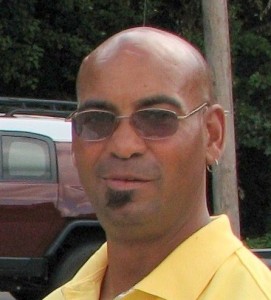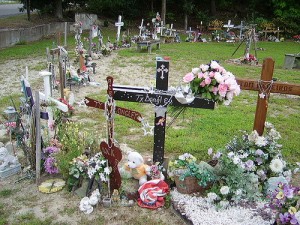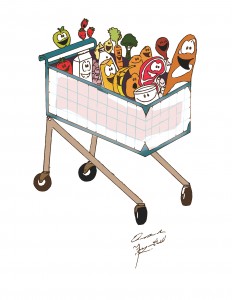Local Heroes
Compassion’s King: Rising from the ashes of the Station Nightclub fire
Sunday, Dec 01, 2013 1:48 pm
  After his brother died in the Station nightclub fire in 2003, Jody King chose to forge a deep alliance with two of the  men held  criminally responsible for the tragedy. Today, he heads the Station Education Fund along with Jeffrey and Michael Derderian, the Station co-owners who pled no-contest in 2004 to 100 counts of involuntary manslaughter.Â
After his brother died in the Station nightclub fire in 2003, Jody King chose to forge a deep alliance with two of the  men held  criminally responsible for the tragedy. Today, he heads the Station Education Fund along with Jeffrey and Michael Derderian, the Station co-owners who pled no-contest in 2004 to 100 counts of involuntary manslaughter.Â
 By Leslie Schultz
Almost a decade after his 39-year-old younger brother Tracy died in the Rhode Island Station nightclub fire, Jody King sits on his couch in a modest home in Warwick, Rhode Island, and explains gently to a curious visitor that there are some things he heard, smelled, and saw that night that he will never tell anyone, no matter how politely he is prodded.
Just days before, King had finally fed hundreds of newspaper clippings from the stories that followed the fire to a makeshift backyard pyre. It was one more step in a cleansing that has allowed Jody to keep his heart open to the right people, and banish the vitriolic, so that he can remain the man he is today: kind, available, patient, and engaged with the community of survivors from that awful night.
King is co-founder of the Station Education Fund (www.stationeducationfund.com), a scholarship program for the victims’ surviving children that he created along with two of the three men held criminally responsible for the 100 lives lost in the 2003 inferno: brothers Jeffrey and Michael Derderian, co-owners of The Station.
For many affected by the fire, the Derderians were and remain a primary target of their grief and anger. But to King, the two men are imperfect human beings saddled with near-unbearable responsibility. And King, quite singularly, is the one fire-victim survivor that has always stood beside the brothers in their remorse.
Head full of boxes
Shortly after 11 p.m. on February 20, 2003, Jody King was wrapping up his day, having just returned home from walking his dog despite the cold and snow. Shortly after he pulled off his coat, his phone rang. It was his sister-in-law Evelyn, calling to ask him to check on her husband Tracy, who at the time was employed as a bouncer at the Station, a small rock venue located in West Warwick. Evelyn had been watching the local nightly news when a reporter broke in with a live report from the club, where a fire had just erupted. Evelyn, who had by then tucked her three young children into bed, could not reach her husband on the phone, and was concerned for his safety.
King gathered up his dog and hopped in his car to head over to the Station just a few miles down the road. On his way, a caravan of fire trucks sped past him, but he didn’t put their appearance together with his sister-in-law’s call. By the time he arrived at the nightclub, barely 10 minutes after speaking with Evelyn, the wooden-framed building that was host that night to a reunion concert of the rock group Great White was enveloped in flames, and the parking lot looked like a wartime triage unit.
“I have more triggers from that night than you can imagine,†says King, a fit, 50-year-old former marine who makes his living as a fisherman along the Rhode Island coastline. “I put all that away in little boxes in my head, and I try not to look inside them.†In fact, King was witness that night to what eventually became one of the worst nightclub fires in the history of New England, and the fourth deadliest in American history.
A snow of soggy ash
Here are some of the facts:The fire began at 11:07 p.m. just seconds after Daniel Biechele, tour manager for Great White, set off pyrotechnics to enhance the excitement of the band’s arrival on stage. Flames from the fireworks immediately ignited sound insulation foam in the walls and ceilings surrounding the stage, engulfing the wood-framed building in minutes. The hundreds attending the concert began to push toward the doors and windows in search of an exit, but the stampede quickly turned to deadly pile-ups.  In addition to the 100 who died trying to flee, 230 people were injured, while another 132 escaped relatively unharmed. The investigation that followed cited both the flammable sound-proofing and overcrowding in the club — packed beyond its regulated capacity — as primary causes of the staggering losses.
But when King arrived that night to check on his brother, little was known about the origin of the flames or the magnitude of the emergency. King stood next to The Station front door for hours, well into the early morning, helping firefighters and neighbors tend to the victims as a snow of soggy ash coated his hair, his clothing, his skin. When the sun began to rise, there was still no sign of Tracy.  “I couldn’t call my mother that night,†remembers King. “I mean, what would I tell her? I can’t find him?â€
Made for the door
Jody King is one of four brothers born to a Jamaican father and Swedish mother. They are a close-knit clan, and Jody is proud to point out that, after a stint in the Marines while in his twenties, he came back to his hometown to pursue a degree in environmental science and forestry and take up the shell-fishing trade alongside his dad. Tracy, too, joined the service as a young man, returning to Warwick to try his hand at several trades before finally settling down to marry and start a family.
Both Jody and Tracy knew the Derderian brothers growing up, a fact critical to understanding Jody’s unshakeable loyalty to the two men he remembers as stand-up guys. Five years older than Jeffrey, King has only vague memories of him as Tracey’s classmate, but he and Michael are the same age and traveled through public school in tandem. That connection eventually led to Tracy’s employment as a bouncer for the Derderian’s Station nightclub venture.
“Tracy was made for the door,†says King with a grin. “He was 6’2’’, 330 pounds, and could control the door with his size and his presence. He could take anyone who was being a pain in the butt and turn him into a marshmallow.† That larger-than-life persona is evident in this video of Tracy posted after his death:
It was in fact his brother’s dedication to the door, to keeping Station patrons safe, that kept him from abandoning his post the night of the fire. That was all King expected when he headed to the Station that cold February night.
“I figured, there’s a problem at the club, so we were just going to go there and watch Tracy do what he did best — handle a problem,†he recalls. “When I got there, it was like nothing you’ve ever experienced in your life. I stood eight feet from the door for a long time. I knew by midnight that I wasn’t going to find Tracy, because I had already seen people who worked there that night, and they hadn’t found him, either, so there wasn’t much hope.â€
Months after the fire, King learned he was right about one thing: Tracy spent his last minutes of life handling the problem at the club.  “I had at least four people, on separate occasions, tell me that Tracy saved their lives. He pushed people through open windows or pushed them out the door. That was my brother, that was who he was, a big teddy bear who loved people and loved kids. And he was also a pain in the ass, and I’d give anything to have one more argument with him.â€
Father of 76
The Station Education Fund helps him keep faith with his lost brother not just by helping the children of the victims, but by standing by the men who befriended Tracy in childhood and gave him a living to care for his family as a grown man.
“You see the color of my skin,†explains King. “I’m fifty years old and went through school in the sixties and seventies. There was a lot more overt prejudice back then, but Jeff and Michael never showed that to us. They were good kids – still are.â€
His respect for the Derderians ran so deep, in fact, that when Michael proposed establishing a scholarship fund for the children whose parents were lost in the Station fire, King immediately stepped up. That was back in 2004, and Michael was on his way to prison to serve four years for pleading no contest to 100 counts of involuntary manslaughter. At the time, very few affected by the fire understood King’s loyalty to the brothers and their cause.
“Initially,†explains King, “the families who lost children or others needed a place to put the blame, and they placed it squarely on the shoulders of the people who owned the club. What some people don’t realize is that Jeffrey and Michael were on a first name basis with a lot of the people who died that night. They were friends to them. If they thought the club wasn’t safe, they wouldn’t have let people in there.†To be sure, the club had passed fire inspections more than once, including a safety pass for the soundproofing that sparked the fatal conflagration.
With Michael in jail, and both he and Jeffrey lightning rods for anger and bad publicity, it fell to King to do much of the talking when it came time to raise money and support for the scholarship fund. (The Derderians remain to this day cautious of the press, concerned that their charity will take back seat to their controversial presence).
When the fund was just a nascent idea, the children of the victims ranged in age from not-yet-born to 22. Â King felt up to the task of fronting the cause, but was uncertain how some of the institutions he approached would feel about a charity founded by the Derderians. He was surprised in the end by how few college administrators resisted his overtures, with many were even grateful to find a way to help Rhode Islanders heal from the tragedy. Today, the Station Education Fund has raised over 13 million dollars in scholarship funding from Johnson & Wales University, Providence College, New England Tech, Roger Williams University, Brown University, Salve Regina, and Bryant University.
Spurned by survivors?
In the beginning, quite a few of the families affected by the fire spurned the scholarship fund, feeling it was essentially tainted with the blood of those lost. But in time others came to understand the intent was aimed at helping children, not absolving blame. Last fall, one of the 76 children of the victims was enrolled in college on a full Station-sponsored scholarship, and another is currently accepted for the fall of 2011 with scholarship funding. A number of the kids have also been supplied with books and computers from the money raised by the Station Education Fund Charity Motorcycle Ride, which has been held every September for the past four years. With the success of the rides and the scholarships, King likes to proclaim that, although technically childless, he is now the proud father of dozens of children he hopes will all one day be helped by these efforts.
“It’s been tremendously helpful in his healing process,†says Jody’s wife, Liana King. “He’s his happiest when he’s organizing the charity rides.â€
Liana met and married Jody several months after the fire, and is in no small measure another healing force in her husband’s life. Although she didn’t know Jody at the time of the fire, she remembers watching the live news feed of the Station that night, and the shadowy figure near the door that she latered learned was Jody, hovering at the spot where he would expect to find his brother on any normal night.
“There was a fireman at the front door that night,†recalls Jody, finally deciding to open one of those grim boxes in his head. “I watched him try to pull a body out from the pile, and all that came out were two hands. And the fireman took those hands down the stairs and took a piece of the sheet that had another body on it, and he respectfully put the hands down, covered them up, and went back to work. This is how you know how well they do their jobs.â€
No doubt Jody recognized in that fireman’s gesture the same compassion he displays–especially for those found liable in his brother’s death.
Â
Leslie Schultz is the founding editor of New Paris Press. She can be reached at newparispressfb@gmail.com.
2 Responses to “Compassion’s King: Rising from the ashes of the Station Nightclub fire”
By JM:
Tuesday, Oct 11, 2011 7:36 pm
Great story. I stumbled on the site thanks for Grub Street writers. Well told. What an amazing man Mr. King is to try to find something good amid all the loss, anger and pain. There is a time for grief and there is a time to forge ahead and honor the memory of the lost.
A bit of poetry from Wordsworth seems fitting:
Though nothing can bring back the hour
Of splendour in the grass, of glory in the flower;
We will grieve not, rather find
Strength in what remains behind;
By leslie:
Wednesday, Oct 12, 2011 12:01 pm
Jody is indeed a person to be admired. Thanks for stopping by to read his story.
By JM:
Tuesday, Oct 11, 2011 7:36 pmGreat story. I stumbled on the site thanks for Grub Street writers. Well told. What an amazing man Mr. King is to try to find something good amid all the loss, anger and pain. There is a time for grief and there is a time to forge ahead and honor the memory of the lost.
A bit of poetry from Wordsworth seems fitting:
Though nothing can bring back the hour
Of splendour in the grass, of glory in the flower;
We will grieve not, rather find
Strength in what remains behind;
By leslie:
Wednesday, Oct 12, 2011 12:01 pmJody is indeed a person to be admired. Thanks for stopping by to read his story.






Leave a Reply